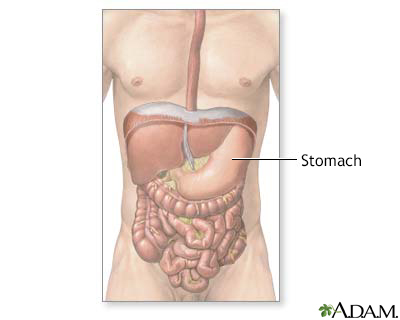Easing the Burn: Erin Finds GERD Relief at UF Health
Erin woke up and felt a sunburn in her throat. However, the source of her discomfort was not visible and had little to do with the beating Florida sun. Still,…

Update your location to show providers, locations, and services closest to you.
Digestive diseases are disorders of the digestive tract, which is sometimes called the gastrointestinal (GI) tract.
In digestion, food and drink are broken down into small parts (called nutrients) that the body can absorb and use as energy and building blocks for cells.
The digestive tract is made up of the esophagus (food tube), stomach, large and small intestines, liver, pancreas, and the gallbladder.
The first sign of problems in the digestive tract often includes one or more of the following symptoms:
A digestive disease is any health problem that occurs in the digestive tract. Conditions may range from mild to serious. Some common problems include heartburn, cancer, irritable bowel syndrome, and lactose intolerance.
Other digestive diseases include:
Tests for digestive problems can include colonoscopy, upper GI endoscopy, capsule endoscopy, endoscopic retrograde cholangiopancreatography (ERCP), and endoscopic ultrasound.
Many surgical procedures are performed on the digestive tract. These include procedures done using endoscopy, laparoscopy, and open surgery. Organ transplants can be performed on the liver, pancreas, and small intestine.
Many health care providers can help diagnose and treat digestive problems. A gastroenterologist is a physician specialist who has received extra training in the diagnosis and treatment of the digestive disorders. Other providers involved in the treatment of digestive diseases include:

Höegenauer C, Hammer HF. Maldigestion and malabsorption. In: Feldman M, Friedman LS, Brandt LJ, eds. Sleisenger and Fordtran's Gastrointestinal and Liver Disease: Pathophysiology/Diagnosis/Management. 11th ed. Philadelphia, PA: Elsevier; 2021:chap 104.
Kliegman RM, St. Geme JW, Blum NJ, Shah SS, Tasker RC, Wilson KM. Digestive system disorders. In: Kliegman RM, St. Geme JW, Blum NJ, Shah SS, Tasker RC, Wilson KM, eds. Nelson Textbook of Pediatrics. 21st ed. Philadelphia, PA: Elsevier; 2020:chap 123.
Mayer EA. Functional gastrointestinal disorders: irritable bowel syndrome, dyspepsia, esophageal chest pain, and heartburn. In: Goldman L, Schafer AI, eds. Goldman-Cecil Medicine. 26th ed. Philadelphia, PA: Elsevier; 2020:chap 128.
Erin woke up and felt a sunburn in her throat. However, the source of her discomfort was not visible and had little to do with the beating Florida sun. Still,…

December 3, 2019
Consuming a seaweed found near the Florida Keys may offer health benefits in preventing colon cancer and inflammatory diseases of the digest tract, according…
College of Pharmacy, +1 more
